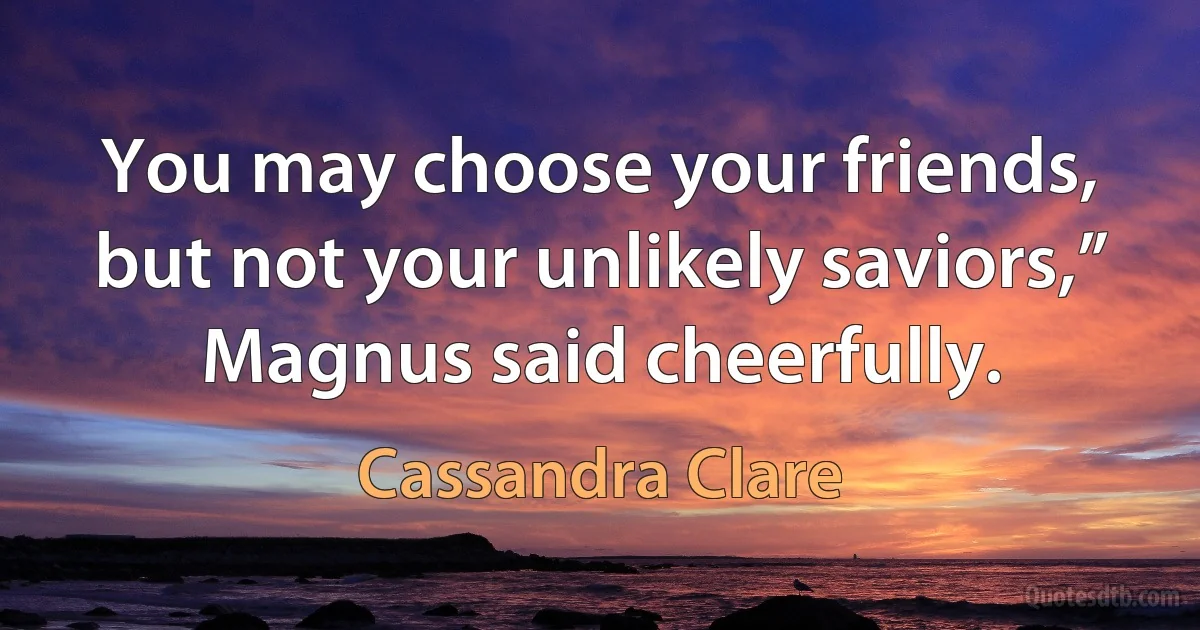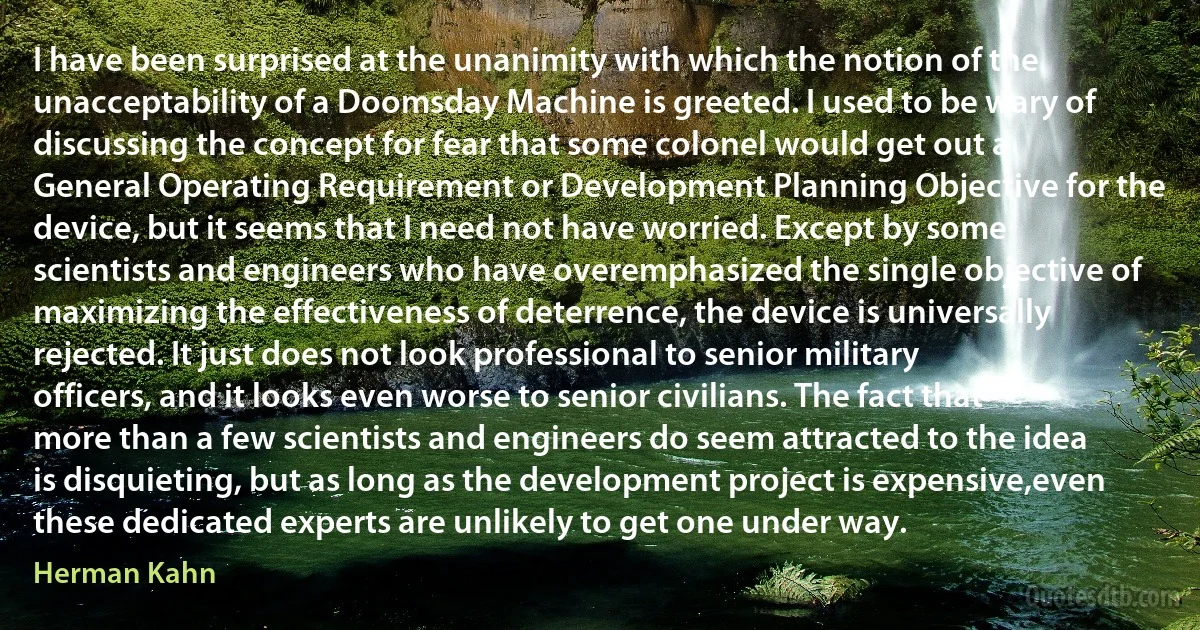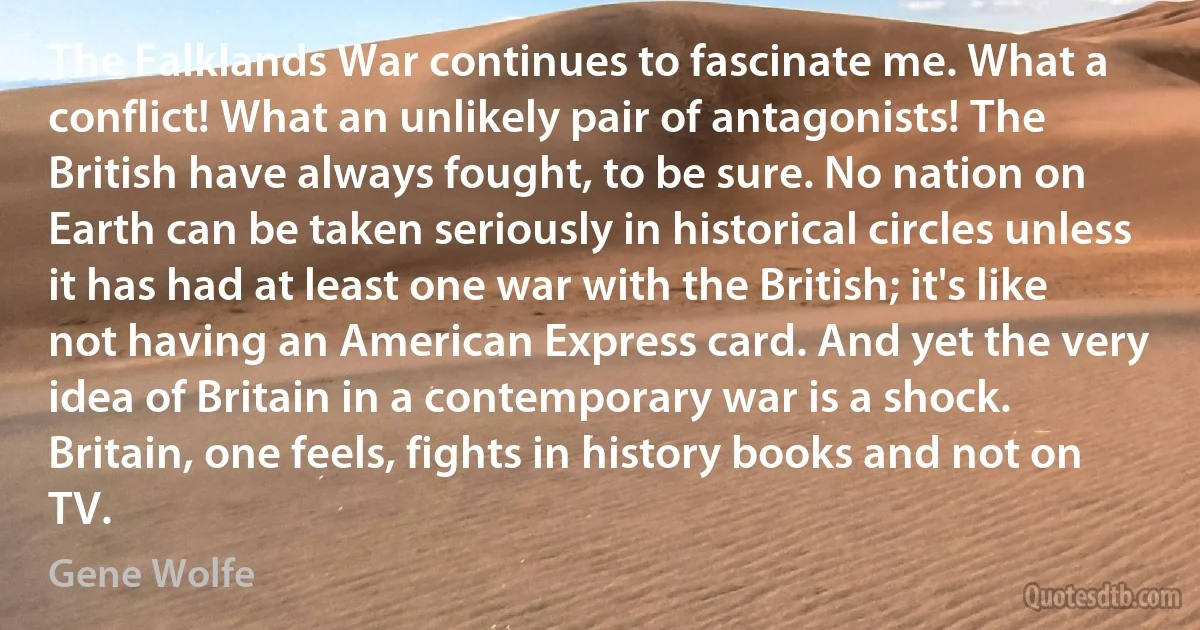Unlikely Quotes - page 4
In the street the rain was little more than a fine mist which softened the outlines of the houses and even lent a touch of poetry to a neighbourhood unlikely to evoke tender emotions. He raised his eyes to a roofline bristling with television aerials, lowered them again to windows still blank before the evening lights were lit.

Anita Brookner
Everything in nature lives according to some order so it seems unlikely that humans live outside this system, even if they try to resist their instincts. That's how we can be sure we're not animals, this refusal to abide by what we know is good for us. If an animal's instinct tells him to avoid something he has no trouble keeping a wide berth. We, on the other hand, run in the direction of danger if it offers a thrill or satisfies a curiosity.

Chrissie Hynde
Everything that seems like a disability with Trump always turns out to be an advantage. If we were in the laboratory, designing the perfect presidential candidate, it's unlikely we would have produced a tasteless, publicity‐seeking, coarse, billionaire, reality TV star. Ha! Look at how wrong we were. It turns out, that is exactly what we needed.

Ann Coulter
As Edward P. Tryon of Columbia University once put it: "In answer to the question of why it happened, I offer the modest proposal that our universe is simply one of those things that happen from time to time." To which adds Guth: "Although the creation of a universe might be very unlikely, Tryon emphasized that no one had counted the failed attempts."

Bill Bryson
The trend of employment is towards a high level, and a recurrence of chronic mass unemployment is most unlikely. The Keynesian techniques are now well understood, and there is no reason to fear a repetition of the New Deal experience of a government with the will to spend its way out of a recession, but frustrated in doing so by faulty knowledge. The political pressure for full employment is stronger than ever before; the experience of the inter-war years bit so deeply into the political psychology of the nation that full employment, if threatened, would always constitute the dominant issue at any election, and no right-wing party could now survive a year in office if it permitted the figures of unemployment which were previously quite normal.

Anthony Crosland
On the longest of timescales, over millions of years, the workings of chance defied human intuition. Humans were equipped with a subjective consciousness of risk and improbability suitable for creatures with a lifespan of less than a century or so. Event that came much less frequently than that-such as asteroid impacts-were place, in human minds, in the category not of rare, but of never. But the impacts happened even so, and to a creature with a lifespan of, say, ten million years, would not have seemed so improbable at all.
Given enough time even such unlikely events as ocean crossings from Africa to South America would inevitably occur, over and again, and would shape the destiny of life.

Stephen Baxter
For, for aught we know, or for aught that the new science can say to the contrary, the gods which play the part of fate to the atoms of our brains may be our own minds. Through these atoms our minds may perchance affect the motions of our bodies and so the state of the world around us. To-day science can no longer shut the door on this possibility; she has no longer any unanswerable arguments to bring against our innate conviction of free-will. On the other hand, she gives no hint as to what absence of determinism or causation may mean. If we, and nature in general, do not respond in a unique way to external stimuli, what determines the course of events? If anything at all, we are thrown back on determinism and causation; if nothing at all, how can anything ever occur? As I see it, we are unlikely to reach any definite conclusions on these questions until we have a better understanding of the true nature of time.

James Jeans
Unless during the first five years so great a degree of change has been accomplished as to deprive Capitalism of its power, it is unlikely that a Socialist Party will be able to maintain its position of control without adopting some exceptional means, such as the prolongation of the life of Parliament for a further term without an election.

Stafford Cripps
Let me be clear: the upcoming Majles elections in Iran is nothing but a sham, and the Iranian people – whether they are compelled by a variety of reasons to take part, or whether they are able to withstand enormous pressure and boycott the elections – know full well that, no matter who gets into the next Majles, they are unlikely to truly represent their will, desire and vision for Iran. Consequently, the next Majles will continue to remain a mere pawn in the hands of the "Supreme Leader” and his cohorts.

Reza Pahlavi
The results of Socrates' martyrdom and Plato's unexcelled prose that followed are nothing less than the whole world of Western man as we know it. If the idea of truth had been allowed to perish unrediscovered by the Renaissance it's unlikely that we would be much beyond the level of prehistoric man today. The ideas of science and technology and other systematically organized efforts of man are dead-centered on it. It is the nucleus of it all.

Robert M. Pirsig
On May 19, 2009, I was taken to the White House to meet President Obama. We'd met once before when he'd visited the Pentagon during his first week in office, but as DJS I'd been in a collection of other civilian and military leaders, so it was unlikely he remembered the man who would soon command his military effort in Afghanistan. I'd been in the Oval Office before with President George W. Bush, but the atmosphere in the West Wing in the final and opening months of administrations differed perceptibly. Although it was four months into Obama's term, there was still a feeling of newness to the people, who moved with an air of excited purpose through the hallways. When the president was available, the door opened and Obama walked to the entrance to greet me into the room. The meeting was short, but cordial. The president offered no specific guidance but locked his eyes with mine and thanked me for accepting the responsibility.

Stanley A. McChrystal



